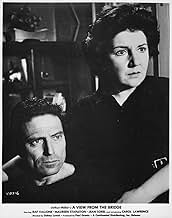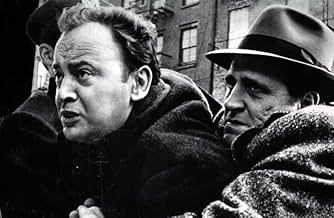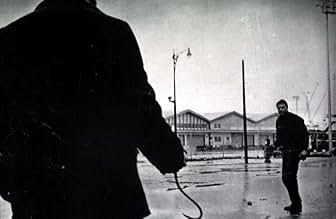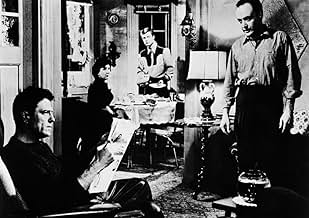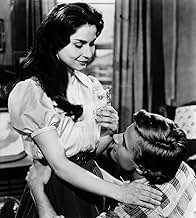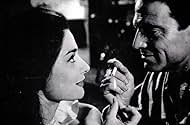Eddie harbors secret love for his niece Catherine. When her cousins, illegal immigrants Marco and Rodolpho, arrive, Catherine falls for Rodolpho. Eddie, consumed by jealousy, reports the imm... Read allEddie harbors secret love for his niece Catherine. When her cousins, illegal immigrants Marco and Rodolpho, arrive, Catherine falls for Rodolpho. Eddie, consumed by jealousy, reports the immigrants, leading to tragic consequences.Eddie harbors secret love for his niece Catherine. When her cousins, illegal immigrants Marco and Rodolpho, arrive, Catherine falls for Rodolpho. Eddie, consumed by jealousy, reports the immigrants, leading to tragic consequences.
- Awards
- 1 win total
Michel Mourlet
- Extra
- (uncredited)
Featured reviews
A View From The Bridge transcends its stage-play roots to give an earthy feel for its neighborhood and its neighbors. This is high praise considering the play is one of Arthur Miller's very best to begin with. The chemistry is devastatingly hot between Raf Vallone and his illicit love for niece Carol Lawrence who, at first admires him, but later turns on him with disgust. Maureen Stapleton is magnificent as Vallone's desperate wife. Vincent Gardenia is disarmingly young in an early role. The cinematography seems to peel the layers of this blue-collar area like an onion, and the score is simply perfect. A View from the Bridge is a neglected classic that needs to be restored to prominence.
Often, when you get films with multiple production countries behind them, you can end up with a bit of a mess that ties to pander more to its investors rather than its audience. Here, the casting of Raf Vallone as the increasingly troubled "Eddie" and a selection of other European actors actually helped to authenticate the Tower of Babel that New York City actually was. He is a manual worker who has long since only being going through the motions with wife "Be" (Maureen Stapleton) whilst becoming increasingly infatuated with his niece "Catherine" (Carol Lawrence). When two of her cousins arrive on the doorstep, promising that they are looking for work, they sleep on the couch and fairly swiftly she takes a bit of a shine to "Rodolpho" (Jean Sorel) - much to the chagrin of "Eddie". With the atmosphere in their tiny apartment becoming more and more toxic and claustrophobic, it may only be the presence of the elder and more savvy "Marco" (Raymond Pellegrin) that is restraining "Eddie" from asserting himself, violently, and despite the woes of both his wife and "Catherine". When the two youngsters announce their impending nuptials, "Eddie" seeks legal advice from his friend to see if he can thwart their plans, but all he can do is report them to the immigration authorities. What might that achieve for all concerned? Though it's quite heavily abridged, and we don't really get to appreciate the supporting characters as fully as I'd have liked, Vallone really does deliver quite powerfully here. So does the underused Stapleton whose affection for her husband, despite his only thinly-veiled desire for "Catherine", and her understanding nature would challenge the patience of any of the saints routinely referred to as this torrid scenario unfolds. The photography is up close and personal, and I thought Sidney Lumet allows the strength of the story to be played out by actors who almost sweat their roles onto the screen. I did not love the denouement, it is rushed and in many ways incomplete, but this is an authentic looking critique on the lives of immigrants hoping, optimistically, for the American dream, and is worth a watch.
I saw this when it was first released, but I've never seen it since, not even on Turner or AMC. I'd love to know why it sank out of sight. Perhaps because Raf Vallone was virtually unknown in the USA? (Maybe if it had starred Van Heflin, who originated the lead role on Broadway.) I am glad to see a new production of it is underway. With Miller's recent death, maybe it will attract the attention it deserves as Miller's homage to Greek tragedy adapted to the lives of "ordinary" working people and to modern stagecraft. After more than 40 years, I finally saw a stage production last night, by the University of Oregon Theater Arts Dept. For a college production it was more than adequate, despite the awful acoustics of their theater. The young actor who played Eddie Carbone was quite good. But it whetted my appetite for a professional production. It's available in VHS on Amazon, but I don't want to buy it, just watch it.
This play by Arthur Miller was filmed by Sidney Lumet in France, but why? Lumet brings us the gritty and dark world of immigrant longshoreman Eddie Carbone (Raf Vallone) and his family ... wife Maureen Stapleton and her niece Carol Lawrence. Carbone is involved in illegally bringing two Italians (cousins of Stapleton) into the US and getting them jobs on the wharfs of New York City. But something goes very wrong when the younger man (Jean Sorel) starts to get involved with Lawrence and Carbone's jealousy and lust for the girl come to the surface.
All the main characters live in a small and squalid apartment, the perfect setting for the pent up lust and anger that fuels the actions of the characters. The more Carbone lusts for the girl, the more he despises the young Italian and his "foreign" ways, hinting at his homosexuality because he is blond and likes to sing.
Vallone is superb as the volatile and treacherous Eddie Carbone who finally is consumed by his raging passions. Stapleton is solid as the aggrieved wife who remains loyal even as she slowly begins to understand her husband's actions. Jean Sorel is terrific as the young Italian as is Raymond Pellegrin as his older brother.
The real surprise here is Carol Lawrence as young Catherine. Generally considered a musical performer (WEST SIDE STORY), she turns in an amazing performance the innocent girl who finally comes of age.
Co-stars include Morris Carnovsky as the compassionate lawyer, Vincent Gardenia as the grocer, Harvey Lembeck, Frank Campanella, and Mickey Knox as co-workers.
All the main characters live in a small and squalid apartment, the perfect setting for the pent up lust and anger that fuels the actions of the characters. The more Carbone lusts for the girl, the more he despises the young Italian and his "foreign" ways, hinting at his homosexuality because he is blond and likes to sing.
Vallone is superb as the volatile and treacherous Eddie Carbone who finally is consumed by his raging passions. Stapleton is solid as the aggrieved wife who remains loyal even as she slowly begins to understand her husband's actions. Jean Sorel is terrific as the young Italian as is Raymond Pellegrin as his older brother.
The real surprise here is Carol Lawrence as young Catherine. Generally considered a musical performer (WEST SIDE STORY), she turns in an amazing performance the innocent girl who finally comes of age.
Co-stars include Morris Carnovsky as the compassionate lawyer, Vincent Gardenia as the grocer, Harvey Lembeck, Frank Campanella, and Mickey Knox as co-workers.
Based on a play by Arthur Miller, the film is very typical of its era (where many such classic plays were adapted for the screen) but also characteristic of director Lumet - who was constantly striving to push barriers (among the themes touched upon here are incest and homosexuality!) and always put his greatest emphasis on the acting. In fact, the cast here is an eclectic but surprisingly effective mix of American, French and Italian actors (though set in Brooklyn, the film was actually shot in France!) - with Raf Vallone especially impressive in his difficult role. The film's dock-side setting (gloomily photographed by Michel Kelber) recalls, to a certain extent, ON THE WATERFRONT (1954) - though this is more of a domestic melodrama; still, the final confrontation between Vallone and Raymond Pellegrin (with its tragic aftermath) reaches a fine pitch of tension.
Did you know
- TriviaThe screen play is based on the stage play "A View From the Bridge" by Arthur Miller which opened at the Coronet Theater on September 29, 1955 and ran for 148 performances.
- Alternate versionsTwo separate versions were filmed: one in English, the other in French.
- ConnectionsFeatured in The Celluloid Closet (1995)
- How long is A View from the Bridge?Powered by Alexa
Details
- Runtime
- 1h 50m(110 min)
- Color
- Aspect ratio
- 1.37 : 1
Contribute to this page
Suggest an edit or add missing content


